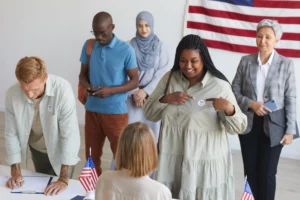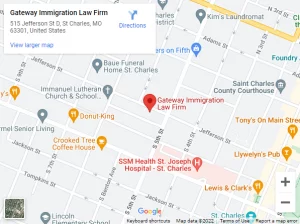Building Inclusivity: Tackling LGBTQ Immigration Issues in Columbia, MO
LGBTQ immigration issues in Columbia, MO make immigration law complicated. This category addresses LGBTQ families’ difficulties when reuniting or starting new lives in the US. The road can be difficult and require legal aid.
These cases are complicated by discrimination, policy, and legal interpretation. LGBTQ immigration issues include visa applications, asylum claims, and family-based petitions. Due to complex laws and society, the process might be confusing.
Quick Summary
Below is an overview of the key points of this blog post article.
- LGBTQ individuals have immigration options in the United States, but they face unique challenges.
- Family-based immigration allows U.S. citizens to petition for same-sex spouses, with recognition needed in the marriage’s country of origin.
- Employment-based immigration permits foreign nationals with business visas to include same-sex spouses as beneficiaries.
- Waivers can help those with immigration violations, considering hardships on eligible family members.
- Deportation cases involving LGBTQ individuals may require skilled immigration lawyers to avoid removal.
- Asylum offers protection for LGBTQ individuals facing persecution based on traits or beliefs.
- USCIS recognizes transgender issues but seeking legal advice for immigration complexities is crucial.
- Same-sex couples can now access the same immigration benefits as heterosexual couples.
- The process for petitioning a same-sex spouse for a green card is similar to opposite-sex marriages.
- Proving the authenticity of a same-sex marriage is essential to avoid immigration challenges.
- A bona fide same-sex marriage is one based on genuine love, not for immigration benefits.
- Various documents can be used to demonstrate the validity of a same-sex marriage.
- LGBTQ immigration rights have evolved, with LGBTQ individuals now enjoying equal rights.
- Immigration rights apply to married LGBTQ couples, but the marriage must be legally recognized.
- Children of same-sex couples can also benefit from immigration sponsorship.
- LGBTQ immigration through refugee and asylum status is an option for those facing persecution based on sexual orientation.
What Are the LGBTQ Immigration Challenges in Columbia, MO?
LGBTQ immigrants have alternatives under US immigration law. The Homeland Security and Justice Departments accepted same-sex marriages for immigration in June 2013. Still, LGBTQ immigrants face many difficult issues that require careful attention.
Family-Based Immigration
US citizens can petition for same-sex spouses. The country where the marriage occurred must recognize it. A foreign spouse can apply for a green card in the US by staying. Immigration restrictions may force some to leave.
US citizens abroad can appeal for their fiancé. Marriage in the US allows residency without leaving. Same-sex spouses can also receive family-based visas. Legal marriage recognizes stepchildren.
Employment-Based Immigration
Foreigners with business visa petitions can add same-sex spouses as derivative beneficiaries. The word covers the qualifying immediate family. Principal beneficiary categorization determines visa classification.
Waivers
Some people who are ineligible for entry into the US owing to a criminal or immigration infraction may be able to get a waiver. Most exemptions require proving hardship to a qualified family member, usually a US citizen or lawful permanent resident spouse.
Since same-sex marriages are officially recognized, hardship evaluation will evaluate any prospective challenges for the US citizen spouse. This is significant when the foreign national’s home country has severe LGBTQ policies.
Deportation
Many ways to escape deportation require showing hardship on a spouse, parent, or child. Skilled immigration lawyers can identify these concerns and decide the best case approach.
As many nations openly oppress LGBTQ people, asylum or withholding of deportation before an immigration judge is crucial. LGBT people confront additional challenges during deportation.
Asylum
Asylum protects persons who fear persecution in their home country for their ideas or attributes. If your home nation allows LGBTQ or HIV-positive persecution, see an immigration attorney about requesting asylum.
LGBTQ and HIV-positive people can benefit from complex asylum laws. No one should be sent back to a nation where they may be persecuted or allow others to persecute them for their sexuality.
Transgender Identification Issues
USCIS generally provides helpful policy guidance on transgender matters. However, when navigating the complexities of immigration law, seeking legal advice is crucial.
What Are the LGBTQ Challenges During the Immigration Process in Columbia, MO?
USCIS treats applications from same-sex couples just like those from heterosexual couples. However, when a U.S. citizen or green card holder applies for a marriage-based green card for their foreign spouse, they might encounter additional challenges.
No Connection With In-Laws
For legal documentation of your marriage, add photos of you, your spouse, and your family. Include these images in your initial application to demonstrate your actual friendship.
Same-sex couples may have trouble answering these questions if their spouse’s family doesn’t accept them or doesn’t know about their sexuality. In such instances, honesty is ideal. Explain why you haven’t met them instead of pretending you don’t know.
How Can I Handle This?
Your petition can include everyday activities to prove a legally valid marriage, which is difficult. Letters to your in-laws reveal your true bond. You’ll have a green card interview during the marriage green card process.
Bring these images and be ready for immigration questions. They may ask about your spouse’s parents and siblings or your shared experiences.
Absence of Job or Housing Records
Sharing a lease, bank accounts, or listing your spouse as an emergency contact or beneficiary on work paperwork shows a genuine marriage. This can be difficult for same-sex couples, especially in jurisdictions where LGBTQ people are not protected from housing or job discrimination.
How Can I Handle This?
A shared lease proves cohabitation. You can also utilize joint utility bills, matching driver’s licenses or IDs, or government documentation proving your common address.
Suppose you lack employment-related documents mentioning your spouse. In that case, you can provide alternative proof, such as:
- Statements from a shared bank account
- Proof of being listed as beneficiaries on each other’s life insurance policies (they don’t have to come from an employer)
- Credit card statements held jointly
The key is to show that you share a residence and financial commitments.
Past Heterosexual Marriages
Same-sex couples seeking green cards may worry about heterosexual weddings. Be honest since immigration authorities will find out if you lie.
To confirm your heterosexual or same-sex marriages ended legally, provide the marriage, divorce, or death certificates on your I-130 petition. Also, mention this in your green card interview.
However, if you or your same-sex spouse previously applied for a green card based on a former heterosexual marriage, it can be more challenging. This could indicate a fake marriage for immigration or green cards.
How Can I Handle This?
Suppose you’ve become a U.S. citizen or a permanent resident through a previous marriage and want to sponsor your spouse for a green card. In that case, your current marriage will undergo close examination.
Be prepared to honestly explain why you were in a heterosexual marriage if any of these conditions apply to you or your previous marriages. Same-sex couples may face special challenges in confirming their marriage’s legal legality.
What Are My LGBTQ Immigration Rights?
In the past, LGBTQ immigrant rights were nonexistent in the US. Immigrants were denied entry for being LGBT. The Immigration and Nationality Act of 1951 called LGBTQ a “mental defect,” and then a “deviation.”
Immigration policy considered it a medical reason to bar immigrants from the US. Much has changed since then.
Immigrant Rights for Married Couples
LGBTQ married couples can handle U.S. immigration like opposite-sex couples. U.S. citizens or permanent residents can file for immigrant visas for their LGBTQ spouses. To be eligible for immigration, the marriage must be legally recognized where it happened.
In other words, marriage should occur in a country where same-sex marriage is allowed. Marriage would be illegal in Saudi Arabia, where same-sex marriages are illegal. The pair may need a fiancé visa to marry in the US or another same-sex country.
For USCIS to recognize a proxy marriage, it must be consummated. U.S. citizens and permanent residents file Form I-130, Petition for Alien Relative. USCIS will grant the spouse a green card if they match immigration standards.
Children of Same-Sex Couples
Immigrant rights also apply to the children of LGBTQ couples. A U.S. citizen or permanent resident can sponsor their same-sex spouse for immigration, including their children.
Let’s say a gay U.S. citizen marries a Dutch citizen with two small children who must stay with him. The U.S. citizen petitions for CR1 or IR1 immigration visas for his spouse and IR2 or CR2 for his stepchildren.
Stepchildren from same-sex marriages might be beneficiaries (F2A) or derivatives (F3, F4, E1-E4, or DV). Same-sex marriages must have occurred before the child became 18, just as opposite-sex marriages.
Immigrant Rights for Refugees and Asylees
LGBTQ refugee and asylum immigration to the US are increasingly popular. Refugees and asylum seekers may be given protection due to past or prospective persecution based on race, religion, nationality, social group, or political opinions.
Many candidates are from places where same-sex marriages or homosexuality are outlawed. Same-sex marriage is illegal in most countries except for 29. LGBTQ identities are illegal in several African, Middle Eastern, and Caribbean nations.
Assisting LGBTQ Immigrant Individuals and Families in Columbia, MO
The complex LGBTQ immigration issues in Columbia, MO require professional advice and steadfast support. At Gateway Immigration Law Firm, we value our knowledge and experience. We help LGBTQ people and families overcome immigration obstacles.
Our knowledgeable immigration lawyers provide compassionate and effective legal solutions to help you achieve your immigration goals. If you or a loved one has LGBTQ immigration issues, contact Gateway Immigration Law Firm.
We understand these situations’ specific difficulties and intricacies and can provide legal assistance and support. Amnesty, Diversity Visa, and Adjustment of Status are available from our law practice. Start a better future in the US today by contacting us.







